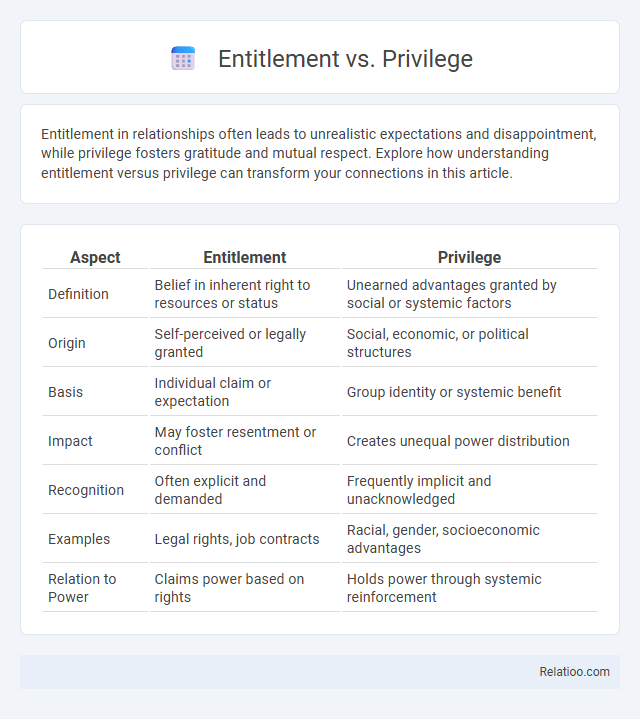Entitlement in relationships often leads to unrealistic expectations and disappointment, while privilege fosters gratitude and mutual respect. Explore how understanding entitlement versus privilege can transform your connections in this article.
Table of Comparison
| Aspect | Entitlement | Privilege |
|---|---|---|
| Definition | Belief in inherent right to resources or status | Unearned advantages granted by social or systemic factors |
| Origin | Self-perceived or legally granted | Social, economic, or political structures |
| Basis | Individual claim or expectation | Group identity or systemic benefit |
| Impact | May foster resentment or conflict | Creates unequal power distribution |
| Recognition | Often explicit and demanded | Frequently implicit and unacknowledged |
| Examples | Legal rights, job contracts | Racial, gender, socioeconomic advantages |
| Relation to Power | Claims power based on rights | Holds power through systemic reinforcement |
Understanding the Concepts: Entitlement vs Privilege
Entitlement refers to a guaranteed right or benefit granted to an individual by law or policy, while privilege represents a special advantage or permission that can be granted or revoked based on circumstances or behavior. Understanding the distinction between entitlement and privilege is crucial for recognizing the stability of legal rights versus the conditional nature of privileges in social or organizational contexts. Clear differentiation helps inform policy-making, legal interpretation, and personal expectations regarding access and benefits.
Historical Roots of Entitlement and Privilege
The historical roots of entitlement trace back to legal and social systems where individuals were granted specific rights based on laws, such as property ownership or citizenship, reflecting formal recognition by institutions. Privilege originated from hierarchical social structures, often linked to class, race, or gender, where certain groups inherently had advantages and access to resources without formal claims. Understanding these origins clarifies how entitlement is framed as a legitimate claim, while privilege denotes unearned benefits embedded in societal norms.
Social Impacts of Entitlement
Entitlement often leads to social friction by fostering unrealistic expectations and diminishing personal accountability, which can strain community resources and relationships. Unlike privilege, which is an unearned advantage, entitlement reflects a perceived right to specific benefits, potentially causing resentment among those without such claims. Understanding the social impacts of entitlement helps you navigate interactions more empathetically and promotes a more equitable society.
Privilege in Modern Society
Privilege in modern society refers to unearned advantages granted to individuals or groups based on attributes such as race, gender, socioeconomic status, or education. Unlike entitlement, which is a right formally owed to someone, privilege often functions invisibly, reinforcing systemic inequalities and limiting social mobility for marginalized communities. Understanding privilege is crucial for addressing power imbalances and promoting equity within contemporary social frameworks.
Key Differences Between Entitlement and Privilege
Entitlement refers to a guaranteed right or benefit granted to an individual or group based on laws or policies, whereas privilege denotes a special advantage or immunity granted selectively, often without universal guarantee. Understanding the key differences between entitlement and privilege helps you recognize that entitlements are protected rights you inherently possess, while privileges are conditional benefits earned or given. This distinction is crucial for navigating social, legal, and professional contexts where rights and advantages differ significantly.
Recognizing Privilege in Everyday Life
Recognizing privilege in everyday life involves understanding the unearned advantages or benefits that you may receive based on aspects such as race, gender, or socioeconomic status, which differ fundamentally from entitlements, which are rights granted by law or policy. Privilege operates subtly, often unnoticed, while entitlement is explicit and guaranteed, and entitlement in a broader sense can refer to the perception of deserving something without necessarily having a legitimate claim. By becoming aware of your own privileges, you can better foster empathy and contribute to social equity, challenging the assumptions that shape unfair systems.
The Psychology Behind Entitlement
The psychology behind entitlement reveals a complex interplay between an individual's perceived rights and actual privileges granted by society or authority. Entitlement often stems from deeply ingrained beliefs about deserving certain outcomes regardless of effort, while privilege refers to unearned advantages linked to social identity or status. Distinguishing entitlement from privilege highlights how cognitive biases and social conditioning influence expectations and behavior, impacting interpersonal relationships and social dynamics.
Overcoming Entitlement: Steps Toward Humility
Overcoming entitlement requires recognizing the difference between entitlement, privilege, and responsibility by cultivating humility through self-awareness and gratitude practices. Embracing a mindset that values others' contributions and acknowledges one's position fosters empathy and reduces the demand for unearned benefits. Consistent reflection on personal attitudes and engaging in community service can transform entitlement into a genuine appreciation for shared opportunities and collective well-being.
Addressing Privilege for Social Equity
Addressing privilege for social equity requires recognizing the systemic advantages some groups possess, which are often unearned and perpetuate inequality. You can promote fairness by differentiating privilege--an unearned advantage--from entitlement, which implies a rightful claim, and ensuring policies focus on dismantling these barriers. Prioritizing awareness and equity-driven initiatives helps create inclusive environments where opportunities are accessible to all, regardless of inherent privileges.
Cultivating Awareness: Moving Beyond Entitlement and Privilege
Cultivating awareness involves recognizing the subtle differences between entitlement, privilege, and empowerment to foster empathy and social responsibility. Entitlement often implies a perceived right without earned merit, while privilege denotes unearned advantages linked to social or systemic factors, and empowerment reflects genuine agency and opportunity. Moving beyond entitlement and privilege requires intentional reflection and education to dismantle biases and promote equitable access to resources and opportunities.

Infographic: Entitlement vs Privilege
 relatioo.com
relatioo.com